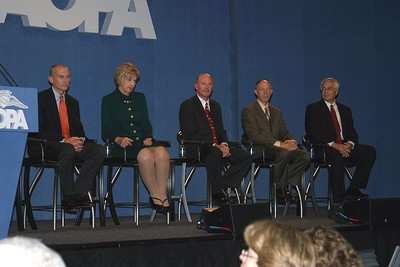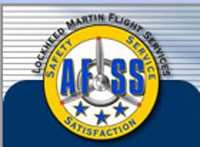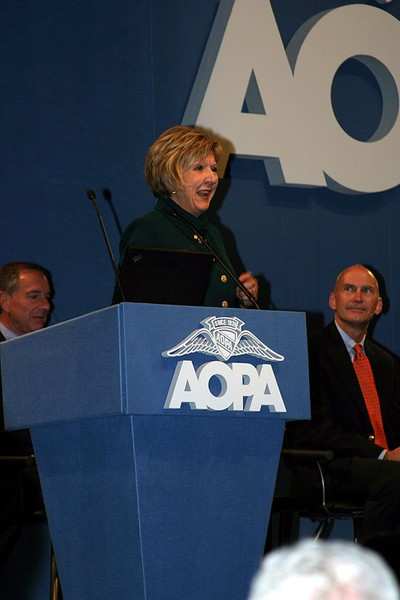Boyer Delivers 'State Of The Union' Concerning Funding
Debate
by ANN Correspondent Dave Ziegler
 AOPA President Phil Boyer spent the
lion's share of Saturday's general session on the status of the
user fees for General Aviation debate. Despite recent victories for
GA, Boyer warned that the fight isn't over yet. "We're in the
Terminal Area, we are within site of the airport, but there is some
convective weather ahead, and that's probably the best way to
describe where we are right now."
AOPA President Phil Boyer spent the
lion's share of Saturday's general session on the status of the
user fees for General Aviation debate. Despite recent victories for
GA, Boyer warned that the fight isn't over yet. "We're in the
Terminal Area, we are within site of the airport, but there is some
convective weather ahead, and that's probably the best way to
describe where we are right now."
After displaying several anti-GA advertisements currently found
on airport terminal televisions, airline seatbacks, and newspapers
throughout the country, Boyer shared counter-ads produced by the
Alliance for Aviation Across America (AAAA) and funded by the AOPA
and NBAA. These responses highlight DOT studies that claim most
delays are caused by weather and the commercial airlines
themselves. "The airlines would have you believe that General
Aviation is the cause for all the delays at the major airports,"
explained Boyer. "In fact, we're only 4% of the traffic at the top
10 airports."
Speaking about General Aviation's most recent victory in the
House of Representatives, Boyer said that "on that side of Capitol
Hill, they passed the House bill that we support by 267 to 151."
H.R. 2881, or the FAA Reauthorization Act of 2007, passed on
September 20th with no mention of user fees, but instead includes a
small tax increase on AvGas and a slightly larger tax increase on
turbine fuel.

The Senate Commerce Committee had previously passed its own bill
which included user fees for turbine aircraft and a 100% increase
on the turbine fuel tax and eliminated the only aviation tax paid
by the airlines. "In effect, the Senate Finance Committee rejected
their ideas, changed the taxes keeping the airline fuel tax
… and kept our GA taxes at a reasonable level."
In its current state, however, the bill still contains a $25
user fee for turbine aircraft. "We hope to be able to take care of
that in a different kind of way," said Boyer, who hopes for an
amendment to remove the user fee during a full Senate vote.
Afterwards, a Conference committee will bring both bills together
and send the finalized bill to the White House to be vetoed or
signed by the President.
Cebula Discusses FSS Outsourcing
 A quick and informal poll of
Saturday's general session audience by Andy Cebula, AOPA Executive
Vice President of Government Affairs, revealed most attendees who
utilized the Lockheed Martin Automated Flight Service Station
system in the last six months have had problems. "We know it,"
responded Cebula, "and we have been doing a great deal of work on
this because it has been a real frustration for us as an
organization to see how this has just fallen apart and not really
served your needs.
A quick and informal poll of
Saturday's general session audience by Andy Cebula, AOPA Executive
Vice President of Government Affairs, revealed most attendees who
utilized the Lockheed Martin Automated Flight Service Station
system in the last six months have had problems. "We know it,"
responded Cebula, "and we have been doing a great deal of work on
this because it has been a real frustration for us as an
organization to see how this has just fallen apart and not really
served your needs.
According to Cebula, modernization of the old AFSS system --
which utilized 1970s technology -- would result in $2 billion in
savings. "If we would have stayed with this current system, our
fear is that you'd be paying about $9 a gallon, and that would look
just like Europe."
Despite problems with the current FSS system, Cebula
acknowledged that outsourcing was still the right decision, and he
assured members that the AOPA would continue to monitor and demand
action to correct outstanding issues, saying that the AOPA has
been, and will remain, in communication with the FAA and Lockheed
Martin on a daily basis. One of the biggest problems still facing
pilots is lack of local area knowledge by briefers.
To help pilots, AOPA introduced a briefing tips card that can
help pilots navigate their way through the new system to find a
briefer in their area. The cards were handed out at AOPA Expo and
will be made available in the November issue of AOPA Pilot and the
December issue of AOPA Flight Training.
New AOPA Website, Air Safety Foundation Offerings
Acting in her new role of AOPA Executive Vice President of
Communications, Karen Gebhart introduced AOPA's new web site, which
went live on September 19th. The completely redesigned site
utilizes newer web technologies for richer content and takes into
consideration the many suggestions offered by AOPA members,
including more non-advocacy news coverage, better organization, and
improved readability.

Also new for AOPA members is a whole new safety seminar from the
Air Safety Foundation, presented during the general session by ASF
Executive Director Bruce Landsberg. The new seminar, which made its
debut at AOPA Expo 2007, discusses the top five ways GA pilots end
up in fatal accidents, and what you can do to avoid making the same
mistakes.
The ASF also offers a new online course for owners and operators
of aging aircraft. This interactive course discusses factors that
affect the rate of aging, such as storage, use, abuse, and
maintenance. It also offers suggestions for proactive inspection
and maintenance practices, and explains the difference between
chronological and true age. More information on both of these
offerings can be found on the Air Safety Foundation website.
 ANN FAQ: How Do I Become A News Spy?
ANN FAQ: How Do I Become A News Spy? Aero-News: Quote of the Day (10.28.25)
Aero-News: Quote of the Day (10.28.25) ANN's Daily Aero-Linx (10.28.25)
ANN's Daily Aero-Linx (10.28.25) NTSB Final Report: Aviat Aircraft Inc A-1B
NTSB Final Report: Aviat Aircraft Inc A-1B ANN's Daily Aero-Term (10.28.25): Hold For Release
ANN's Daily Aero-Term (10.28.25): Hold For Release






